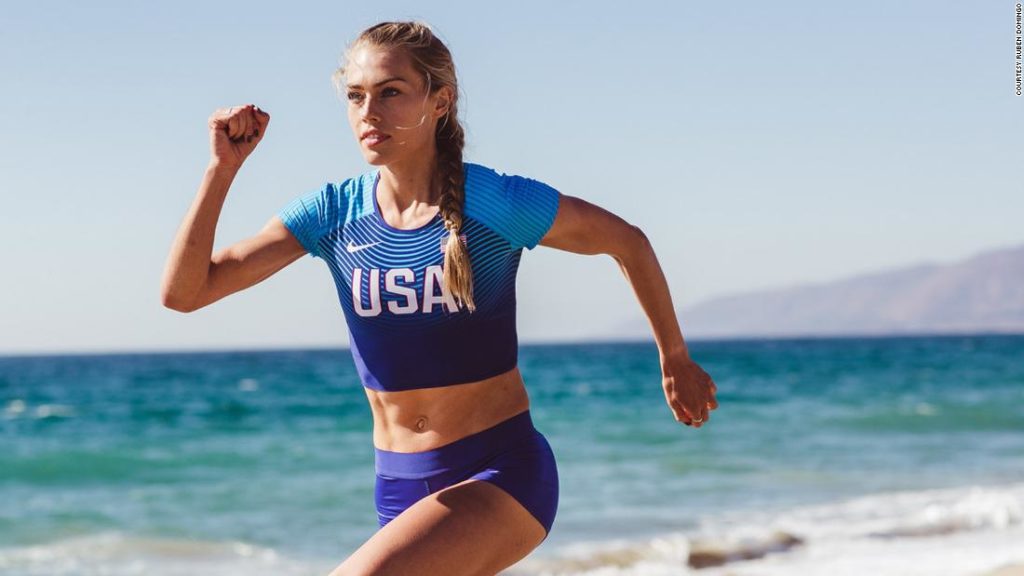For Colleen Quigley, a 3000-meter steeplechase runner from the United States, there’s some relief that she “discovered mental health” a year and a half ago.
The revelation has not only helped her to face the challenges of canceled track meets and a disrupted schedule, but also to become a better athlete.
“And I kind of got over the ego of actually working on that side of my game — thank goodness I did — and started with some meditation and some journaling stuff on my own.
“Then in the summer of 2019, I finally got convinced to start talking to a mental coach.”
Barriers and water jumps
Quigley, who has been training at altitude in Flagstaff, Arizona, as she prepares for Olympic qualification later this year, now builds meditation, breathing exercises and weekly meetings with a mental coach into her schedule. Walking her dog Pie has also proved a tonic for the mind.
“Everybody needs a little bit of mental coaching, a little mental support, especially in a year like this where no matter who you are, you’ve been challenged in a new, different, crazy way,” she says.
“I think a lot of athletes don’t give that enough credit or see it as a weakness.”
Her personal best of 9:10.27 in the 3000-meter steeplechase — an event that requires negotiating 28 barriers and seven water jumps around seven-and-a-half laps of a track — is the third-best time in American history behind Courtney Frerichs and Emma Coburn, both of whom ran alongside Quigley in Rio.
The 28-year-old arrived at professional athletics via an unconventional path, never anticipating when she was growing up that she would run at an Olympics. As a teenager, it was a career as a model that beckoned.
“It was a different high school experience for me,” says Quigley.
“Definitely none of my other classmates were skipping out on a couple of days of math and English and science to go to Turks and Caicos and shoot with some company for Glamour magazine for a couple of days.
“It was super fun — I feel very lucky that I had a really positive experience.”
‘No regrets’
After high school came the decision of whether to take up an athletics scholarship with Florida State University, or to move to New York, sign with an agency and try to become a supermodel.
“I’m not going to sit here and say it was a no-brainer; it was a hard decision for me at the time,” says Quigley.
“I thought that life was going to be really glamorous and awesome. And I didn’t really know what being an NCAA athlete was going to be like. It was never a dream for me as a kid.”
Looking back though, Quigley has “absolutely no regrets” about her career path.
Since turning professional, she has undertaken modeling campaigns for Nike — the sponsors of Bowerman Track Club, her former training group in Portland, Oregon — but insists that being an athlete remains her priority.
“I’m training really hard and I don’t have the flexibility to go from Flagstaff, where I’m spending eight weeks at altitude, to fly to New York for three days and shoot something and come back to training and try and pick up where I left off,” she says. “It’s just really hard on your body to do that.”
After winning an NCAA title in 2015 and joining the Bowerman Track Club shortly afterward, Quigley made her Olympic debut the following year.
“I think I surprised myself in that almost immediately after the Games, I was just hungry for more. And I wanted to see what else I could do,” she says.
“And I wanted to immediately start making plans to go back in four more years and do it better and do it bigger … I was eighth and didn’t know what the heck I was doing.”
With five-and-a-half months until the Olympics are due to start, what format this year’s Games will take remains uncertain.
Upcoming indoor track races were wiped from Quigley’s schedule, and last week, she competed in her first race without representing a sponsor or her country having recently left the Bowerman Track Club.
Yet to announce where she will be training in the future, she remains confident and focused with the Olympics on the horizon.
“I’ve gotten a lot stronger and just learned a lot about myself as an athlete and as a person,” says Quigley.
“And so that’s really exciting — to go into another Olympic year feeling like an even more confident version of that kid that I was in 2016.”
You may also like
-
Super League: UEFA forced to drop disciplinary proceedings against remaining clubs
-
Simone Biles says she ‘should have quit way before Tokyo’
-
Kyrie Irving: NBA star the latest to withhold vaccination status
-
Roger Hunt: English football mourns death of Liverpool striker and World Cup winner
-
‘Every single time I lift the bar, I’m just lifting my country up’: Shiva Karout’s quest for powerlifting glory

